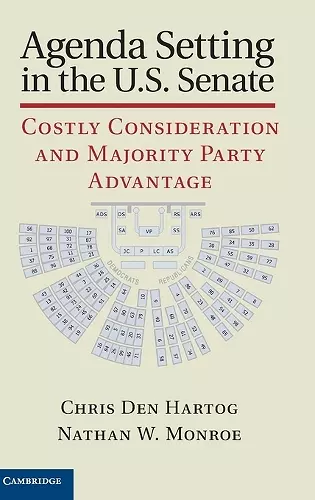Agenda Setting in the U.S. Senate
Costly Consideration and Majority Party Advantage
Chris Den Hartog author Nathan W Monroe author
Format:Hardback
Publisher:Cambridge University Press
Published:16th May '11
Currently unavailable, and unfortunately no date known when it will be back

Proposes a new theory of Senate agenda setting.
This book proposes a new theory of Senate agenda setting that reconciles a divide in literature between the conventional wisdom – in which party power is thought to be mostly undermined by Senate procedures and norms – and the apparent partisan bias in Senate decisions noted in recent empirical studies.Proposes a new theory of Senate agenda setting that reconciles a divide in literature between the conventional wisdom – in which party power is thought to be mostly undermined by Senate procedures and norms – and the apparent partisan bias in Senate decisions noted in recent empirical studies. Chris Den Hartog and Nathan W. Monroe's theory revolves around a 'costly consideration' framework for thinking about agenda setting, where moving proposals forward through the legislative process is seen as requiring scarce resources. To establish that the majority party pays lower agenda consideration costs through various procedural advantages, the book features a number of chapters examining partisan influence at several stages of the legislative process, including committee reports, filibusters and cloture, floor scheduling and floor amendments. Not only do the results support the book's theoretical assumption and key hypotheses, but they shed new light on virtually every major step in the Senate's legislative process.
'Agenda Setting in the U.S. Senate is a major contribution to scholarship about the chamber and about legislative leadership in general. In contrast to the traditional portrayal of Senate party leaders as relatively weak, Den Hartog and Monroe provide a compelling conceptual rationale and ample empirical evidence for consequential leadership within the chamber. Their masterful book belongs on the shelf of any serious student of congressional politics.' C. Lawrence Evans, College of William and Mary
'Scholars and the media have given so much attention to the filibuster and minority party power in the contemporary Senate that one would think nothing else matters. Yet, as Den Hartog and Monroe remind us, a number of major pieces of legislation manage to overcome this roadblock. In Agenda Setting in the U.S. Senate, they address this seeming contradiction and provide an essential balance in their thoughtful and carefully crafted research. Den Hartog and Monroe explain under what conditions major legislation passes the Senate and how the majority party and its leadership are far from powerless in moving their agenda forward. The book is theoretically grounded, analytically stimulating, and substantively rich.' Bruce I. Oppenheimer, Vanderbilt University
'The rise of partisanship in the contemporary Senate raises tough questions for students of Congress. How can we square evidence of majority party influence with the chamber's history of supermajority rules and practices? In Agenda Setting in the U.S. Senate, Den Hartog and Monroe offer a new perspective on parties in the Senate, suggesting that partisan influence pervades the legislative process. This book will surely turn heads as scholars grapple with Den Hartog and Monroe's impressive arguments and wide-ranging evidence. I highly recommend it.' Sarah Binder, George Washington University and The Brookings Institution
'With sensible theory and considerable empirical analysis, Den Hartog and Monroe provide a useful corrective to the two extreme views that sometimes seem to dominate portrayals of political parties and majority party agenda control in the contemporary Senate - the 'it's just like the House' argument and, on the other extreme, the 'parties don't matter' meme.' Barbara Sinclair, University of California, Los Angeles
'In recent years there have been many indications that legislative parties are consequential in the Senate, but the theoretical arguments that provide explanations for this pattern have been few and limited. In this small but important book the authors argue (both formally and informally) that the majority party has procedural advantages that make it less costly to get a final vote on its proposals than the minority party. The authors enrich their formal argument with extensive examples from Senate practice and provide support for their theoretical predictions with solid systematic evidence. This book will receive a lot of deserved attention from students of the Senate, and it will influence the course of future research.' David W. Rohde, Duke University
ISBN: 9781107006461
Dimensions: 234mm x 157mm x 22mm
Weight: 470g
252 pages